NatWonk – Our Sibling Site

NatWonk – Naturopathic Research Reviews

NatWonk – Naturopathic Research Reviews
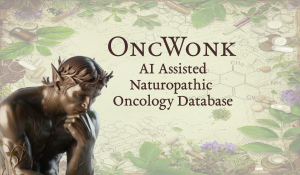
Revolutionizing Naturopathic Oncology Research for Healthcare Professionals Contact Us for a complimentary 1 month trial. Introducing OncWonk, the groundbreaking AI-assisted Naturopathic Oncology Database meticulously curated to empower healthcare professionals with unparalleled access to cutting-edge research. This exclusive platform houses an expansive collection of nearly 120,000 articles from the medical literature dedicated to the exploration and […]
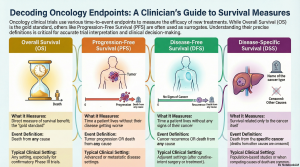
The following analysis differentiates Overall Survival (OS), Progression-Free Survival (PFS), Disease-Free Survival (DFS), and Disease-Specific Survival (DSS). These endpoints are distinct time-to-event metrics used to evaluate the efficacy of antineoplastic therapies. The definitions and interpretations below are grounded in the FDA Guidance on Approaches to Assessment of Overall Survival in Oncology Clinical Trials and the RECIST […]
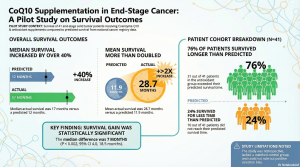
💬Comment: This is a pilot study and has a lot of weaknesses in terms of study design. However it also shows a median actual survival time 40% longer than predicted—17 months versus 12 months—in this highly selected group of end-stage patients. The authors rightly point out the major methodological flaw of a retrospective, non-randomized, and […]
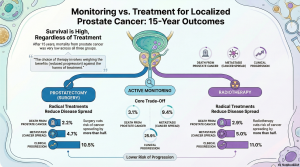
Comment: This 15-year mortality data from ProtecT is a powerful addition to the 12-year patient-reported outcomes (PROs). underscoring the equivalence between the groups in terms of overall survival, but differences in functional outcomes. We already knew from the PROs analysis that generic quality-of-life scores were similar across all three groups (Active Monitoring, Prostatectomy, Radiotherapy) by […]
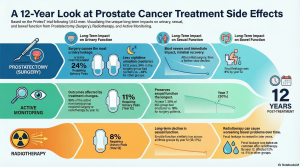
Comment: This analysis provides critical long-term data and most importantly context for localized prostate cancer treatment decision making. The most striking takeaway is the lack of difference in cancer-specific, or overall survival among the three groups (prostatectomy, radiotherapy, and active monitoring) over the 12-year follow-up. Given that there is no difference in overall survival between […]
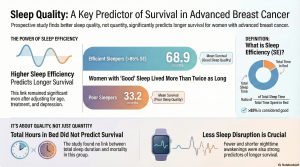
Comment: This is a study I go back to again and again as it’s well designed and demonstrates how important quality sleep is not just for quality of life, but for a significant improvement in overall survival.We have many tools to help with sleep, including reminding people of the importance of it. This study highlights […]
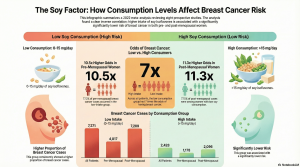
Comment: This meta-analysis offers another powerful, data-driven affirmation of what the most up-to-date research has been telling us: consuming soy isoflavones is safe, and may even be protective, for women concerned about breast cancer. The narrative around soy has been dominated by mechanistic concerns and rodent studies instead of a focus on human data. Current […]
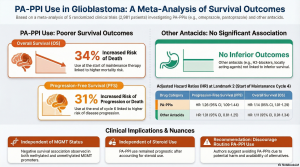
Comment: Another study (see here) showing that PPIs lead to worse outcomes, this time reducing both progression-free and overall survival. We have better tools, but if a medication is necessary, other options such as H2 blockers are a better choice. Summary: Clinical Bottom Line This meta-analysis of individual patient data suggests that the use of […]
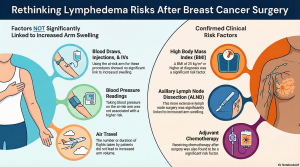
Comment: This study offers yet more reassuring data to challenge the long-held mythology surrounding lymphedema precautions. For years, the conventional wisdom has dictated a strict avoidance of blood pressure cuffs, blood draws, and injections in the at-risk arm. However, this rigorous prospective analysis confirms what many clinicians have suspected: routine, necessary medical procedures are not […]
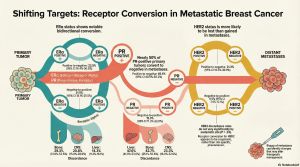
Comment:⚠️ This systematic review and meta-analysis consolidates the global data, providing moderate certainty evidence that the receptor status of a breast cancer is far from static. The findings confirm that the tumor we treat at the metastatic stage is often biologically different from the primary tumor excised years earlier. The high conversion rates are not […]
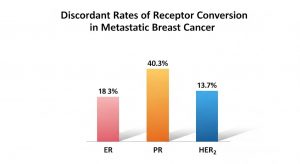
Comment:🩺 This study of 390 paired primary and metastatic breast cancers provides some of the most compelling institutional data to date, confirming the biological profile of a breast cancer can and often does change dramatically upon metastasis. The sheer magnitude of the discordance rates—especially the 40.3% change for Progesterone Receptor (PR) and the 18.3% change […]
Medical Information Notice
The content on this website (
OncWonk.com) is for informational and educational purposes only. It is not intended to provide medical advice or to be a substitute for professional medical advice, diagnosis, or treatment.Do not disregard professional medical advice or delay in seeking it because of something you have read on this website.
If you think you may have a medical emergency, call your doctor or 911 immediately.
This site does not establish a physician-patient relationship. Reliance on any information provided by this website is solely at your own risk.
By clicking “I Accept,” you acknowledge and agree to our full Terms of Use and Medical Disclaimer.
